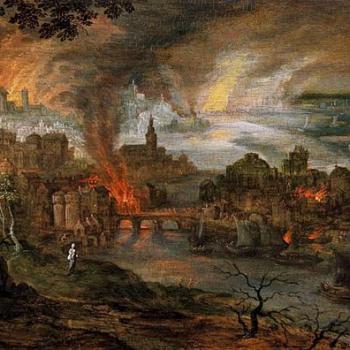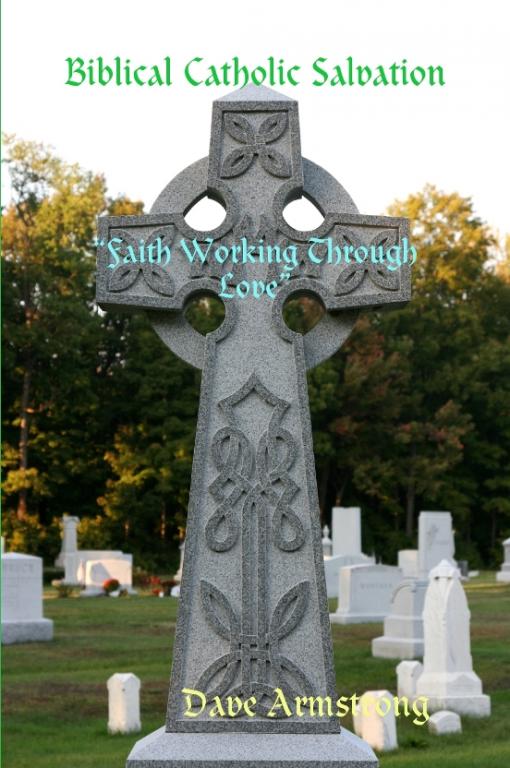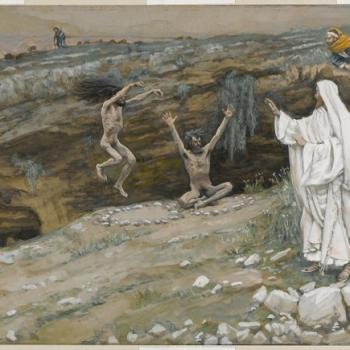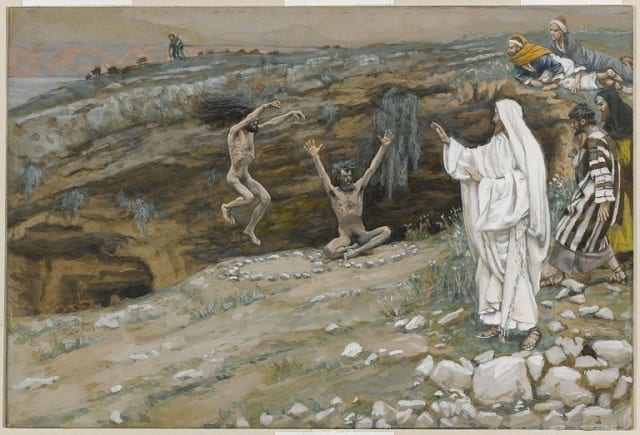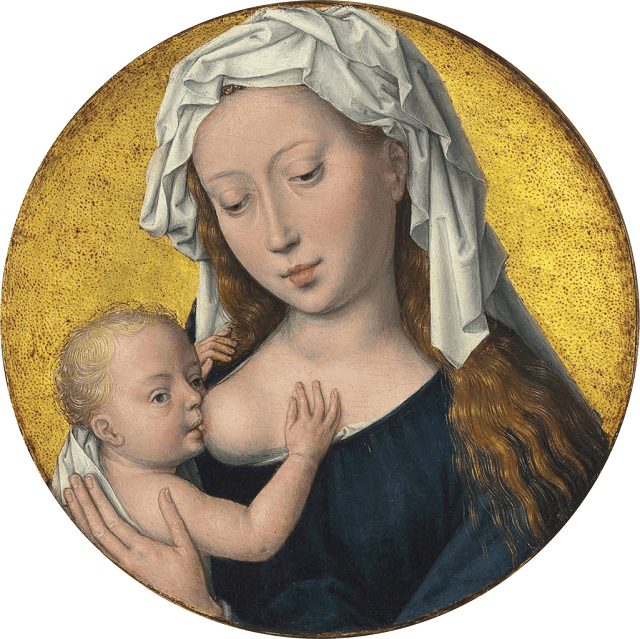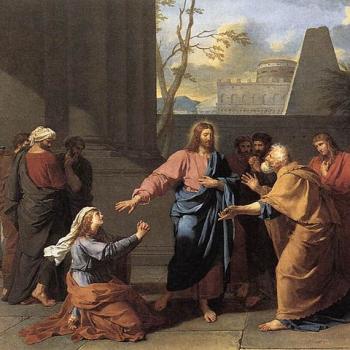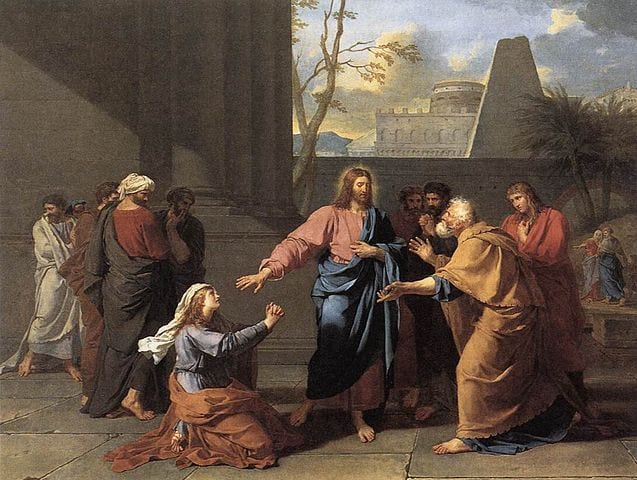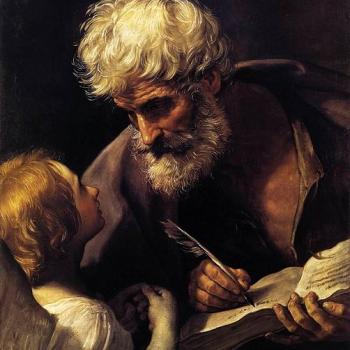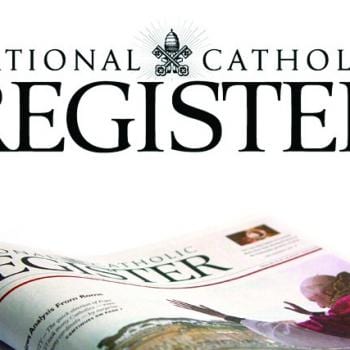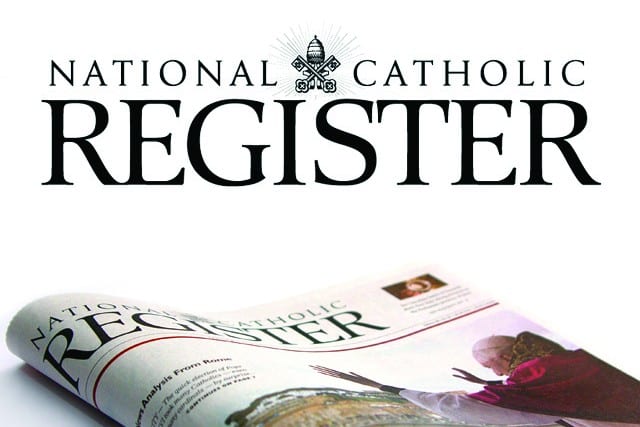
The following exchanges with an Orthodox apologist from ROCOR (Russian Orthodox Church Outside Russia: a group that considers itself “traditionalist” and non-ecumenical), took place on my public “Apologetics/Ecumenism” discussion list in 1998. It is edited somewhat (i.e., both sides of certain portions, equally) in order to eliminate extraneous or irrelevant material. My Orthodox friend’s words will be in blue.
*****
There is a school in Orthodoxy which does not view ‘heterodox’ (I mean that kindly) as Christians in the visible sense of the term. It’s an all or none issue with them. But even that view can be stated cordially.
So how do such people define the word Christian then? Synonymous with Orthodox, and then only some Orthodox?
Orthodox are Orthodox until they apostatize, simple. Regardless of “jurisdiction.”
But this didn’t answer my question. You must define “Christian” (and — preferably — tell me the source of your definition, and why you accept its authority) for that is central to the discussions of list purpose, and the nature of ecumenism.
We’ve had Orthodox on this list say Meyendorff, Ware, Hopko, even Franky Schaeffer, for Pete’s sake, were liberals.
Um, the first three are liberals. In an Orthodox sense. Granted, compared to Call To Action they’re reactionaries, but in Orthodoxy they’re liberals. But Schaeffer? Well, he’s moderate. :)
Please elaborate. Is this because they are ecumenical, or for broader reasons? What about Fr. Peter Gillquist too? And Frs. Schmemann, Florovsky, and Sparks? Is Jaroslav Pelikan (the new convert from Lutheranism, and prominent Church historian) a liberal, also?
We believe Orthodox are part of that One Church, whereas many of you wish to exclude us. Other Orthodox are ecumenical. Obviously, the latter group fit better into this list.
But why? Because their beliefs are closer to yours?
No, because this is an ecumenical list, and they are ecumenical. Isn’t that obvious, my feisty friend? :-)
That destroys the point, doesn’t it?
The point is unity and understanding and sharing and persuasion and mutual respect.
I hear “The age of Aquarius” in the background. Sorry.
Very funny; however, none of these concepts are at all foreign to biblical and/or traditional Christianity. I could easily produce several verses for each idea.
If one is not interested in such things, and cannot even regard another believer in the Nicene Creed and a host of other beliefs we all hold in common, as a Christian, then that is a big problem. The point is that there is a bare minimum of assumptions and presuppositions that one must hold in order to even do ecumenism. Otherwise, it reduces to evangelism, as the other guy is regarded as outside of the fold.
That’s also irrelevant to a traditional Orthodox because a traditional Orthodox doesn’t go out and try to convert people.
All Christians are called to evangelize. The fact remains that if you view me and other Protestants and Catholics on this list as non-Christians, then there is a very real sense in which you are evangelizing (however indirectly, subtly, or unintentionally), if you defend your views. If we accept what you say and join up, we are going from darkness to light; whereas if we are all Christians already, a switch is merely moving from one part of the Body of Christ to another.
But we defend and explain our faith, and learn from others, as politely as possible.
That’s fine, as far as it goes, but — as we have seen — there are more fundamental issues here, which are relevant to the List Constitution and our very purpose as a list.
Well, that’s the ideal, but I’m sure many on all sides fail.
Of course. Such is the Christian life. We all strive imperfectly . . .
Even the other “traditional” Orthodox group, as you describe it, is most welcome here if they will simply acknowledge Catholics and Protestants as Christians, according to the Nicene Creed.
Umm…the Nicene Creed lists “one” Church. Are you saying I have to believe we’re all part of it to be on the list?!?
This is what the List Constitution says:
The A/E List exists so that Christians can learn, share, respectfully clarify differences, find common ground, have fun in dialogue, cultivate friendships and, of course, defend their own theological and ecclesiological beliefs (and change them if the evidence warrants it), and so that – hopefully — a pleasant, edifying, and educational experience can be had for all participants.
I am a catechumen in ROCOR. As you probably know, we condemn ecumenism as heretical. So, does this mean I don’t “belong here in the first place” either?
If you can’t abide in good conscience by the list rules, what would you say?
I’d say without traditional voices, we have no link to our past. So I’d say: change the rules.
So by this are you saying that you are not able to abide in conscience by present list rules? I assume you didn’t understand them previously: I hope you weren’t deliberately violating them.
How do you define ecumenism; why do you condemn it?
Because ecumenism is tearing apart a united Orthodoxy. How can we love “Christian unity” when Orthodox Christians are splitting?
That deals with the second question; now please answer the first . . . I won’t get on a tangent about the adjective “united.”
Ecumenism, in the traditional Orthodox view, involves compromise. It involves a recognition of something we never had to recognize before in others. It’s very closely tied to the exclusive nature of Christianity as a whole.
The mainstream Orthodox position on validly baptized Catholic and Protestant converts (as I understand it) is that they need not be re-baptized. Stanley S. Harakas, in his book The Orthodox Church: 455 Questions and Answers (Minneapolis: Light & Life Pub. Co., 1987, p. 243, #319) states that converts who have been baptized “in the name of the Holy Trinity” need not be baptized in order to become Orthodox. I myself witnessed the chrismation of a Presbyterian/Baptist friend of mine with no baptism performed.
Metr. Kallistos Ware writes:
If Roman Catholics become Orthodox, the Patriarchate of Constantinople and the Church of Greece usually receive them by Chrismation; but the Russian Church commonly receives them after a simple profession of faith, without chrismating them. Anglicans and other Protestants are always received by Chrismation. Sometimes converts are received by Baptism. (The Orthodox Church, New York: Penguin Books, revised 1980 edition, pp. 285-286)
This is a clear and unambiguous acknowledgement that baptized non-Orthodox Christians are in the fold (of Christianity) already, much as St. Augustine (and the Catholic Church) regarded Donatist baptism. You have said that all the different Orthodox “are Orthodox,” But here you want to make distinctions, and your “we” apparently excludes what you call “liberal” Orthodox. What gives? If you’re out of step even with the majority of your Orthodox brethren, how is an outsider like me supposed to work through these issues as you present them to me? All I (we) require here is that you acknowledge non-Orthodox as Christians, pure and simple. An easy-enough “demand,” it seems to me. But even that is apparently controversial amongst so-called “traditional” Orthodox. You haven’t answered me plainly on this matter of definition yet.
Would you allow a Mormon on this list? No, because he does not accept the creed.
You got it. Protestants and Catholics alike do accept the Creed. So I don’t get the analogy.
We almost view it as an all or none. Either everyone has the right to call themselves Christians or only we do.
This brings us back to the definition of Christian. I think you are creating enormous historical, theological, and ecclesiological problems for yourself, by adopting this line of thought. What you think is merely having integrity of definition and theology is, in my opinion, in actuality radical and unnecessary (and unbiblical) sectarianism.
If you read my quotes from Leo the Great on the papacy, there is plenty of meaning indeed. Many of the quotes are more like mini-treatises.
See, there’s my point. You’re looking for meaning in the quotes, and we assume the meaning and the quote backs it up. It’s like John 6:53. We understand the discourse as a real presence argument. A Protestant does not, because there it doesn’t directly speak to him as such. Orthodoxy’s beliefs are so defined (and in this way the Romans are like us) that Leo’s quotes don’t have independent meaning; they are part of the theology of the Church.
So then, every patristic statement we come up with which seems to back up our position, is simply defined away as not even possibly expressing anything different than the Orthodox understanding (I call that circular reasoning)? You don’t even acknowledge that individual Fathers could be wrong on certain things? E.g., St. John Chrysostom believed Mary could sin . . . . .
Remember how I partially defined ecumenism. No compromise for a traditional Orthodox. But discussion? Why not?
But rules for discussion? Why not? And what do you suggest I do if you deny that everyone here is a Christian except you and other members of ROCOR, and whomever else is a “traditional” Orthodox? How can you somehow synthesize that with the List Constitution, if in fact that is what you believe? And if so, isn’t that dishonest? It would be like me going onto a list which had in its guidelines the statement (I exaggerate for effect): “We regard Calvinism and Catholicism as both equally valid and true.” Of course I could never join such a list, because to do so would entail accepting what I believe to be a falsehood. Here we have a “minimalist” requirement (just regard the others as Nicene Christians). I never dreamt that that tenet would itself be controversial, but truth is stranger than fiction . . .
A major reason why I didn’t consider Orthodoxy as an option back in 1990, was because the first thing I changed my mind on was contraception [see the paper by William Klimon: Contraception: Early Church Teaching], and because I sought traditional Christian thinking, not faddism and modernism.
This coming from a member of a Church whose liturgy is five years older than I am (I’m 23), . . .
That presupposes that the New Mass is a corruption of the Old, rather than a development; also that any such modifications of liturgy are wrong of their essence [see links which deny this on the Eucharist and Sacrifice of the Mass page]. I find both propositions ludicrous.
. . . whose entire ritual underwent an overhaul (and a relaxation in almost all cases to accommodate; the liturgy of the hours being lengthened to four weeks).
Ditto. One has to show that all this is a corruption, which would have the result that the pope offers up an invalid Mass every day.
I never said I was demonstrating corruption. All I was doing was demonstrating that the ascetic ideal of Christianity and the fear of the sacred was slowly being thrown out the window.
How do you prove this assertion? No one doubts that liberalism has made inroads in the practice of the Mass, or the application of Vatican II, but that is essentially different from the assertion that the liberals have corrupted the Mass and the Council themselves, in their essence. This is your burden of proof.
This coming from a member of a Church whose attempts to eradicate tradition from it’s vocabulary have brought it to the point where it has less than 15 fast days a year,
But we still require celibate priests! :-)
Strange, that “tradition” is only about eleven centuries old, and not fully codified for another two hundred. If anything, the tradition is that the priests shouldn’t be celibate.
You miss my point entirely; which was: why retain celibacy if we are supposedly so dead set against asceticism?
They’re not even “disciplinary matters”. They’re part of what I view as the “ascetic ritual of the Church.” They are not “imposed” in Orthodoxy, so they cannot be “relaxed.” Yet that’s what I’m getting at; no one spoke up, no one fought, no one wanted to keep abstinence on Fridays. Or Wednesdays. Or during Lent. To me, that’s modernism, if not in theory, in practice.
The Friday abstinence requirement is still in place (and during Lent, even the no-meat on Friday requirement remains). You should admire that, as we stopped “imposing” the fasting-from-meat requirement, and made it more general. But it seems we can never please you, no matter what we do (and why should we, anyway? :-). Some of the “traditionalist” Catholics you so admire thought that the Mass in the vernacular was a “liberal development” too, but Orthodox like that, because they had it also (as well as the partaking of the Cup). So who am I to listen to (if I am skeptical of the authority in my own Church)?
These are disciplinary matters, and hence not immune to modification. None of this proves “modernism,” although everyone knows that the liberals (self-described “progressives”) have tried to co-opt Vatican II for their own insidious purposes. Their failure to do so becomes more evident with each passing day . . .
the prayers before and after communion have been shrunk,
Again, this presupposes that liturgy can never be changed in any fashion, which itself needs to be established. Like Bible translation, some of that necessarily takes place whenever a liturgy is put into the vernacular.
new forms of liberal theology have taken over and been embraced,
But not promulgated officially, of course, and that is the bottom line. This is great sophistry, but short of fact and substance, I’m afraid.
(the Pope has even spoken well of liberation theology, something that hits close to home because of my ethnicity),
I would have to see the comment. All errors and heresies have some truth. If indeed the pope did say something nice about it, I’m sure it was in this sense. I can even say something nice about radical feminism, if I think long and hard enough. LOL It might take a few days, . . . :-)
and even says that how the Papacy is understood ecclesiologically is up for debate! (Ut Unum Sint).
I thought Orthodox liked that! You would prefer us to be “rigid” and “triumphalist?” :-)
None of the above are valid arguments in the least; nor does this rhetorical display deal with the matter at hand: that Orthodoxy caved on contraception. I can easily explain your counter-examples, and none of them entail an utter reversal of Christian Tradition, or (as we and all the pre-1930 Christians would see it) calling evil good. That is what you have to deal with, my friend. You like to regard all your Orthodox comrades as brothers — so I have seen on the list — yet you abstractly rail against the “liberals” in your ranks. So if an Orthodox accepts the moral permissibility of contraception, is he a “liberal?” And if so, then how could he be regarded as your “brother?,” by the same reasoning you offer here against me calling [name] a “sister”?:
And please explain as well why you refer to [a Calvinist woman] as a sister, but a traditionalist Catholic on your page as a “schismatic.”
That’s easy. Schismatic Catholics are in deliberate, wanton disobedience to the pope and clear conciliar teaching (such as the status of Protestants as “separated brethren”). Briefly put: they should know better. Deliberate schism itself has been clearly defined by the magisterium. Individual Protestants, however, are not deemed guilty of formal schism or heresy. A Protestant such as [name] has never been under the jurisdiction of the Catholic Church (I am assuming). An individual decision in favor of schism is far different from simply having been born or initiated into a milieu which split off hundreds of years ago (like Orthodoxy :-). The individual is far less culpable in that scenario.
Would you call [name] a sister, by the way?
I would, but that’s because I’ve discussed the faith with her before. She’s uncompromising in a number of areas when it comes to her Bible. So in a limited sense (because at root I can see where she comes from): yes. But I certainly would not do it in a public forum, for reason below.
Why make a distinction between public and private, unless the title doesn’t really apply in the first place?
Would you call me a brother? Let’s get down to the truly objectionable practice here, since you wish to make an issue of it.
On some days. Some days I find your words so far detached from the traditional Christian teaching (like the above on the Mass) that I can’t.
Absolutely asinine. So I leave the faith and come back on certain “good days,” according to you? I thank you that at least you think I am honest. That’s worth something, when many anti-Catholic Protestants can’t even grant us our sincerity or true commitment to Christ.
I don’t have to call someone my brother to care for them. Nor to speak to them politely. Is it not enough of a responsibility that he is the “neighbor” Jesus speaks of?
I guess it boils down to: when does a person gain admission to the Kingdom; the Body of Christ? We say it is at baptism, and recognize all trinitarian baptism. What say ye? If they are in the Kingdom, they are my sisters or brothers in Christ. We serve the same Lord.
But on the surface, we are not brothers.
Are Catholics Christians, though? And if so, how can one be a Christian and not be part of the Body of Christ? If not, on what basis?
We are not united in communion and Orthodox simply cannot throw around the term without good reason. But that doesn’t mean I hate my “non-brothers” or even feel lukewarm. It’s just a term– when you actually care about everybody.
This is not about hatred, but about commanded (and hopefully sought-after) unity and realizing what the requirement is to be a follower of Christ.
But you and [the Calvinist woman] don’t agree on basic principles.<
She is “in Christ” by virtue of her baptism. She is trinitarian, and agrees on a host of doctrines which most thinking Christians consider essential (although we reject an approach which relegates somewhat lesser doctrines to relativism and insignificance). Therefore, she is my “sister in Christ,” notwithstanding remaining serious disagreements. You are my brother on the same basis, as we have even more in common.
Please explain Teilhard De Chardin while you’re at it.
I can’t because I don’t know anything about him, except that I understand that he tried to synthesize evolution and Catholic faith (an endeavor I would find ludicrous, as I reject macroevolution in the first place).
I saw Orthodoxy as curiously and strangely inconsistent on this issue [contraception], as they tended to be traditional on most others; indeed pride themselves (in the good sense) on that characteristic;
This line is ambiguous.
Orthodox pride themselves on being the “Traditionalists” par excellence, yet when it comes to contraception, they bowed to humanist approaches to sexuality and procreation. I find that strangely ironic.
Dave: I love responding to these letters. They always have a particular wit about them that makes them very readable.
Well, that’s nice of you to say. I think readability and a little humor is very important in apologetic literature. Thank you very much.
If you are trying to make a consistent worldview based on the sanctity of life and the Holy Fathers, abstinence would be a far deeper way of dealing with spiritual goals than timing sex.
I don’t see how. You appear to assume that:
- 1) Abstinence is more holy (in general) than sexual relations (for a married couple);
- 2) “Timing” of sexual relations [i.e., Natural Family Planning] is somehow unsavory or unholy.
- 3) (By implication) NFP is less spiritual than “leaving it to God.”
None of these propositions are true. Unless you adopt a position that married couples “leave it to nature” (and ultimately God) entirely, and have sex at will, or conversely, that married couples should live in total and heroic abstinence, then I don’t see how you have a case. NFP is the sensible way of combining both respect for natural law and new life, and the permissibility of couples planning their families with regard to economic, emotional, and health reasons. And it involves abstinence itself (generally about 8-10 days a month). Besides, Orthodox engage in “timing sex” as well, if one considers that they fast certain days, and engage in sex on the others. NFP does no violence to the natural order, nor does it entail a “contraceptive mentality,” as the natural functions are not deliberately impeded.
The New Mass is not a development in the normal sense of liturgical development; . . . To presuppose that the Novus Ordo is a corruption of the old is, quite frankly, giving it too much credit to begin with. It was a complete rewriting of the liturgy.
So the pope offers up an invalid Mass? Or do you believe all Catholic priests do, anyway? Who’s to say what is a development and what isn’t? I’m to believe you over an ecumenical Council? That becomes as individualist as Protestantism, my friend.
The liturgy is, in fact, 28 years old. Its promulgation occurred in 1970. It does not look like the Old Mass, not because of a “change” or “development”, but because the Missal was completely rewritten. So I beg to differ. I do not have to accept either proposition of yours to see this, nor does any objective reader.
Why should I believe you, over against my Church? If the Mass is valid, it is a development, since the whole purpose of the Mass is to offer sacrifice to God in the form of re-presentation of Calvary, and to distribute the Holy Eucharist to Christian believers. If it is invalid, then please make that assertion. This is what your position amounts to. I’m a bottom-line type ‘o guy. Call a spade a spade; I always admire that.
A translation must keep fidelity to the original meaning or it becomes a cheap paraphrase. That seems to have been ignored in a number of cases in the ICEL translations. But again, that’s not the issue. Changes in words occur for a reason. If there was a change in the prayer I could see your point—but a removal? Tsk.
Is it valid or not? If not, why? And if not, was the Tridentine Mass also invalid? Don’t miss the forest for the trees. Within the parameters of validity, one can make legitimate criticisms of the current liturgy, as in fact Cardinal Ratzinger and many other orthodox Catholics have done. But I suspect you want to throw the baby out with the bath water.
By the way, development of doctrine was another major factor in my conversion (the factor, if one is to be chosen). I noted that Orthodoxy developed for several centuries, and then stopped, for all intents and purposes. No more ecumenical Councils, no more primacy of honor of the bishop of Rome, etc. I find that implausible on its face.
And that’s a completely fair reason to be a Roman Catholic-— on the surface. The nature of the development you speak of began to change as well. I guess we could call that “development undergoing development”. There was a communal nature to the development, a continuity with the past, that was completely lost,
“Completely?” Don’t overstate your arguments! They are insufficient enough as it is. :-)
beginning with the West’s understanding of Trinitarian philosophy and its refusal to even listen to its brethren in the East (who had been warning that such a philosophy bordered on modalism).
How is “western” trinitarianism borderline “modalist,” pray tell? This is a new one on me. Funny that you should lecture us about our trinitarian views, when the East was bogged down by all sorts of Christological heresy for many years (Nestorianism, Monophysitism, Monothelitism). It took Pope Leo the Great to straighten things out in the Council of Chalcedon in 451, after the East had formally almost completely apostatized in the Robber Council of 449. If someone requests it, I will post my chart of the dozens of heretical patriarchs in the major sees of the East.
The difference between the two forms of development was such that while the East underwent a careful development of its own understanding of dogma (the Hesychast Controversy, Palamism, et cetera),
Tell me how and in what areas the East has developed its theology in the last — say — 300 years.
the West became more concerned with preserving its alleged authority.
That goes all the way back. And we had to be concerned because so many people didn’t get it. Jesus set it up; we merely preserve it.
Unlike yourself, I am not looking at Rome, I am looking at Roman Catholicism.
And what do you think that proves? That we have forsaken the apostolic line and Nicene Christianity? You tell me. If we are to judge by ignorance and heterodoxy among the masses, then the faith was lost many times throughout history, and much more so in the East.
I like consistency. In a sense, this is why I have so much respect for many traditionalists of the SSPX [a schismatic “Traditionalist Catholic group], and so on: they are consistent with their past, even accept the ugly parts at times.
This is where you are dead wrong. They are radically inconsistent. They arrogantly claim Catholic Tradition as uniquely their own; all the while defying the authority of popes and Councils. They decry modernism; all the while adopting the relativistic individualism and disobedience which are the hallmarks of modernism. They despise nominal “cafeteria” Catholics, then turn around and arbitrarily pick and choose what they “like” in Vatican II. [see my section on these groups on my Church page] And these are the people you admire, eh? You are very confused, if I do say so.
I am against contraception. All of the Churches in my communion are against contraception. I haven’t seen you produce an official Orthodox statement on contraception yet (for all of you who don’t know, Orthodox have encyclicals and official statements as do Catholics);
Then by all means produce one for us! Who can locate official Orthodox statements? And when we do, then we learn that the Russians or the Greeks or ROCOR don’t accept them, anyway. Who can figure all that out? I won’t even try. You are against contraception. Great. So you wish to deny that Orthodoxy as a whole has caved? Very well, then, if they haven’t, then why did Metr. Kallistos Ware say they did? If they have, how do you account for that, and justify it?
Fr. Schmemann (for example) is, while a great thinker, not an official speaker).
Who is? Or are prominent Orthodox figures only authoritative for their own jurisdictions, as in Protestantism?
All we as Orthodox can do is “abstractly rail.” You see, until a council (or a clearly Pan-Orthodox synod) declares something heretical, the best we can do is declare something an innovation, and humbly avoid it. That’s all. It’s not our job to judge, but simply to go with what we know is truly Orthodox.
And you see this state of affairs as superior to what we have? More biblical? No way to authoritatively decide who is a heretic and who isn’t? Just wait a hundred years or more? That’s precisely what brought us the Robber Council of 449.
So if an Orthodox accepts the moral permissibility of contraception, is he a “liberal?”
Not necessarily. Remember, not all Orthodox in this day and age are aware of the traditional Orthodox view (mostly because a lot of it is unpopular, and so quietly ignored by hierarchs —something you should understand because some of yours do it too) and so are a bit lost on the issue. I do feel lucky for my priest.
Is such a person guilty of serious sin, objectively speaking? And if so, what about Orthodox priests who should know better, yet promulgate the permissibility of contraception, which is (or was) a grave sin in both our communions? This is calling evil good. Many people rail against Anglicanism, e.g., for its compromises on issues such as women’s ordination. Yet when it hits home in Orthodoxy, you don’t see that this is a very serious objection to your system – every bit as bad as the compromises in Anglicanism and other denominations.
Both of the Orthodox Churches in question are Orthodox because Orthodoxy as a whole has decided in neither’s favor concerning who is holding Orthodoxy on these issues. Both you and [the Calvinist woman] are clearly holding different beliefs from each other, while in the case of say, myself and [an Orthodox from another more ecumenical jurisdiction], it’s not so clear….
You are the one who:
- 1) Brought this up;
- 2) Said many major Orthodox figures were “liberals” (or “modernists” – I don’t recall which term was used), and that Frank Schaeffer was a “moderate.”
You were the one who made the distinctions in Orthodoxy. Now it seems that you want to run from them. Is that only discussed in private, so as to present the mythical front that Orthodoxy is a united entity?
Am I a “schismatic,” reawakening the hellbound apostasy of the avaricious Michael Kerularios?
If you in fact knew that the Catholic Church was the fullest expression of apostolic Christianity, and rejected it, that would make you an apostate in some sense, yes. But only God and you can determine that. I don’t have access to your heart and deepest motivations. But since we regard Orthodox as the other lung in the Body of Christ, I think the question is much more complex.
What makes me less culpable than a “schismatic” who refuses to attend a Novus Ordo Mass? Since my problems with Catholicism are far deeper ecclesiologically, wouldn’t I be MORE guilty, and not LESS?
It depends on how much you knew before. For one thing, you are no longer under the pope’s jurisdiction, by your own choice [he was a former Catholic]. The schismatic Catholic claims to be Catholic, which by definition is under the pope, yet he refuses to submit to papal authority. That is both material and formal heresy, as well as schism.
I hold to the actual Orthodox view on the issue [contraception].
Who determines what the Orthodox view is? Is there an official Orthodox statement on this, which is binding on all? A simple “yes” or “no” will suffice, with documentation desired but optional. Or do these “official” pronouncements only hold for the many jurisdictions only?
I don’t make critiques of a Church based on its behavior. Remember: I’m not the one that said: “…I sought traditional Christian thinking, not faddism and modernism.” A discussion on behavior should stick with behavior. A discussion on doctrine must stick with doctrine. Consistent? I hope so.
Yes; that’s why I made the comment I did. I was referring to the lack of a condemnation of contraception in Orthodox ranks, and the departure from Tradition, not to behavior. It was in the context of what Tradition to choose (back when I was still evangelical). Lord knows there are legions of ignoramuses (ignoramii?) and rebels and lukewarm hypocrites in all Christian communions. That’s never been any sort of argument from me.
***
I just skimmed your reply (on your website) to my Orthodoxy paper (it’s blazing hot in my library as usual, and I wanna take a dip in my pool — I will read it more carefully soon). Despite all our controversies, I would like to think that we are friends.
But hey; I was skimming through, and getting all motivated and inspired to make a counter-reply (debate does that to me :-), until (to my dismay and disappointment) I came to the following section near the end:
An intelligent person like Dave Armstrong giving such a simple analysis of Orthodoxy demonstrates, yet again, that Orthodoxy is simply misunderstood by the outsider who just doesn’t know what to do with her—a failure garnered by intellectuals since the Gnostics. So I cannot, in conscience, give approbation to such an analysis of my Church. Without the necessary submission, no one can understand Orthodoxy, and Orthodox can’t even understand themselves. [emphasis added]
If I understand correctly (being a lowly “outsider”), you are saying that no one can understand Orthodoxy unless they are Orthodox (and no doubt — knowing you — a “traditional” one). I gratefully thank you, then, for your honesty and thoughtful consideration, as you have saved me much time and effort which would have been consumed in refuting your paper, when in fact it would obviously be a completely futile enterprise – doomed from the outset because I am not Orthodox!
And — assuming you have portrayed Orthodoxy correctly — this also goes to show that my observation of Orthodoxy having an inadequate view of reason is accurate, since if no one can understand Orthodoxy, except by becoming one, then of necessity, there can be no compelling reason to join up in the first place. :-) And that’s one reason I am a Catholic, because I require a reasonable faith (“love God with all your heart, soul, mind, and strength”), not one that itself requires a “leap in the dark” and allegiance before even rudimentary understanding can take place. I refuse to check my brain at the door of any religious faith which I am going to follow. All Christian views require faith; I am not arguing that point. I am discussing the place of reason and rational analysis within Christian faith.
Come to think of it, such an esotericism and “spiritual elitism” as you embrace, in which only the initiates can understand and enter into the mystery of Orthodoxy, itself smacks (in that respect) — ironically — of Gnosticism (as well as many heresies and cults which have indirectly spun off of Protestantism). Thus, you have conveniently created your own little world, which no one in the darkness of non-Orthodoxy can hope to penetrate — it is simply impossible, if we are to take you at your word. We must submit first, then it will come to us (is this similar to the Mormon “burning in the bosom?”).
Apparently, you feel that just by being around Orthodox such as yourself, us Catholics and Protestants might – given enough exposure – “get it” or receive Orthodoxy into our heart and soul by some sort of mystical osmosis, divorced from plain reason, Scripture, Tradition, and the usual apologetic arguments (since those must fail to persuade “outsiders” who can’t hope to understand). I dare say that the ancient Eastern Fathers would not see it that way.
So forgive my ignorance and paltry understanding in my critique, but it appears that it was inevitable and that there was nothing I could do about that short of joining the fold. This explains a lot. Pro-abort women also tell me I can’t understand (or even talk about) abortion, either, not being a woman. Well, I’m just as glad that I am a man, as I am that I am a Catholic. :-)
If you take back this amazing assertion, perhaps I can muster up sufficient motivation to answer your critique. Until then, why should I waste my time, when you have already predicted the inevitable outcome?
On a related note, I still await the response from the more ecumenical Orthodox on the list, as to Orthodoxy’s view of the validity of Catholic sacraments in and of themselves. You claimed I didn’t know what I was talking about when I discussed that (and you were quite “offended”), so I am altogether willing to check with other Orthodox to determine how far off the mark I was. Do both “ecumenical” and “traditional” (in other words, all) Orthodox really agree that Catholic sacraments have no validity?
I said “submission”, not “right faith.” A good number of Eastern Catholics (and even a couple of Western ones) understand Orthodoxy perfectly.
Submission to what? What does it entail? And then one can understand?
Tradition.
So I submit to “Tradition,” which you of course define as Orthodox Tradition. Now, how is that different from becoming an Orthodox in the first place? This is the point I was making. You proceeded to say that I had completely misunderstood your meaning. Yet we seem to have come full circle. I must submit to “Tradition” in order to understand Orthodoxy.
So I guess you don’t believe in the resurrection in the sense of mainstream Christianity. To believe a man (a) is God (b) died and came back three days later requires a great failure of rational thought.
Not at all. A supernatural event does not involve a logical contradiction. It is simply a transcendence of the normal laws of nature. All that proves is that the laws of nature do not hold in absolutely every instance.
There is simply no beauty left in your description of this miracle.
Beauty was not at issue. You claimed that the Resurrection somehow violated logic (itself a “philosophical” argument, and not particularly “beautiful” at that). I disagreed and stated why; now you are confusing a philosophical response with a “beautiful” description of Christian dogma, but those are two completely different things. If you want something mystical, romantic, “right-brained” from me, go read my paper, My “Romantic / Imaginative” Conversion to Christianity (“Romanticism, Wagner, C. S. Lewis, Christianity, and Me”). You might be surprised.
But — as a general point — reason and rationality is not at all intrinsically opposed to great devotionalism, adoration, the ascetic life, mysticism, prayer, the Christian walk, etc. St. Thomas Aquinas illustrated that very well. We observe people like C.S. Lewis who could be both rigidly philosophical and also engage in fantasy and imaginative portrayals of the Christian outlook. The fact that you attempt to create this dichotomy merely reinforces my original critique: viz., that Orthodox tend to undervalue and run down reason, where there is no need whatever to do so. Right reason is a great pillar of supernatural faith. It helps to bolster one’s faith, because God made us rational creatures, and we can’t deny that, as much as we try at times.
I don’t condemn reason. I condemn rationalization– the attempt to explain that which should not be explained.
What shouldn’t be explained? Every doctrine of Christianity? Or just the Orthodox distinctives?
Again, impossibility, Dave, is the substance of Orthodoxy.
Then it is impossible to become Orthodox!
No, perhaps just submission to Church Tradition.
How do I do that? Become an Orthodox? If so, this is a distinction without a difference.
But I guess that’s ok [lack of “beauty” in a philosophical argument], because it is “reasonable.” Can’t you see what I’m getting at here?
Yes; another false dichotomy. You argue, in effect: “If one uses their head, they must needs be minimize or reject the devotional, “spiritual” side of Christian faith.”
It’s this worthless speculation!
You think it is worthless because you have rejected rational analysis (for the moment; however — as is totally expected — you immediately engage in it when it suits your purpose). This is a common trait of “fideistic”-oriented theological viewpoints.
What if I told you nature had no laws?
Then you would render science impossible, and we couldn’t be writing back and forth by computer.
That God did not leave laws of nature, and that he designed everything to have it’s own particular movement? That in so many cases they coincide?
All Christians believe that God upholds everything by the word of His power. That’s beside the point, I would say.
Every doctrine of Christianity so long as it can be accepted with faith.
Then why does Scripture tell us that Paul constantly “argued” and “reasoned” in his attempt to persuade the pagans and Jews of Christianity? Obviously, these hearers didn’t believe first.
If a heresy comes into play, this is when the Church must clarify– and not before!
Paul was reasoning before there were any heresies, e.g., on Mars Hill (Acts 17), with the Greeks in Athens.
It really was the first step I took when I came closer to Orthodoxy.
So the fact that something was “impossible” in its essence appealed to you? This is a Kierkegaardian “blind leap of faith in the dark” at its best! Pure existentialism. Amazing . . .
Read the Holy Fathers and skip Andy Greeley.
I don’t read any Catholic liberals.
All the time. Start with a book meant for a layman — a good one is The Path to Salvation or in the Roman case, perhaps, The Imitation of Christ.
I love The Imitation of Christ. I thought that was more like Scripture than any book I have ever read. It did not make me inclined to become Orthodox, however.
Since that’s clearly repulsive, I would just stick with A Kempis.
And what do you think that will achieve for me? Make me give up my “rationality?” As if that would be a beneficial thing?
As for asceticism, I am a semi-vegetarian (only fish, and poultry occasionally). I have avoided sugar and white flour for now 14 years. You wanna be “disciplined,” try that sometime . . .
Do you fast when you want to, Dave?
Yeah, and even when I don’t want to.
Do you follow the old guidelines?
I don’t eat meat on Fridays! :-)
I’ll take it back when you understand it and reject it.
What have I misunderstood? What must I submit to in order to gain the capacity to understand Orthodoxy? Don’t talk in riddles. Try to think like a Catholic for the moment, just to explain this to me, if you could be so kind.
I can’t force the Orthodox to respond on my behalf. But they know the Tradition. Every acceptance of a Roman sacrament was (and is) by economy– and not by its own merit.
I thought I heard at least one Orthodox list member say the opposite, so who can blame me for being “confused?” It would be a loving act to correct my understanding if in fact I have gotten this wrong. But then again, perhaps economia is no different than us declaring Protestant baptisms valid (since we regard them as implicitly “Catholic”). That may be another distinction without a difference.
I tried, but I seem to get nowhere. Apparently there is some sort of irreconcilable clash between Orthodoxy and Catholicism (i.e., when it comes to reason and epistemology), or just between me and my opponent (or some of both). Perhaps I’m not making myself clear, or my arguments aren’t understood. Whatever the problem is, it is extremely frustrating.
I am literally unable to respond any longer to your counter-replies (at least in this particular debate) because in my opinion you have descended into a blatant and willful irrationalism that makes it very difficult to engage in further discussion (as all discussion — beyond senseless babbling — necessarily presupposes acceptance of the laws of logic). You claim Catholics are overly-rational, or rationalistic, etc. Very well, I reiterate that many (not all) Orthodox tend towards irrationalism. Your last few letters are prime evidence, as far as I’m concerned. As I said, I tried, but I can do no more – my powers (whatever they be) are exhausted, because you either dismiss out of hand, or don’t comprehend my points, and you are making comments which I have not the slightest idea how to interpret myself. Or they are flat-out non sequiturs, from my perspective.
I’m not trying to put you down or ridicule you (you’ll just have to choose whether to believe my self-report or not); this is my sincere opinion at this time about your ideas — not you personally. But in any event, you have made several direct comments to the effect that one must become “crazy” or irrational, or somehow transcend reasoning processes (rather than utilize this God-given gift along with the obvious requirement of supernatural faith) to become Orthodox. That I cannot and will not ever do (if indeed — which I highly doubt — everyone wishing to convert to Orthodoxy must ditch the mind and reason in this fashion). Sorry. To me that is a prerequisite for the lunatic asylum or a Unitarian seminary (if there is such a thing), not the Christian Church, wherever it resides in its fullness.
I am so sorry you ceased from the “debate”, Dave.
Me, too. It is a shame.
But I am confused… why can’t you explain me?
Because you are spouting irrational utterances.
I was only trying to demonstrate a traditional mindset from whence to understand us.
Then obviously you have failed. I don’t speak for anyone but myself in this.
It’s obvious you don’t want that.
No; it’s true I don’t want irrationalism. I am always eager to better understand Orthodoxy, however. You have simply failed in your task to achieve that end. I have shown in another paper how prominent 14th-century Orthodox theologians (and earlier Eastern Fathers and theologians, before the Schism) upheld the (supposedly so distinctively Catholic and “novel” and shocking) notion of the Mediatorship of Mary in spectacular (not to mention eloquent) fashion. Now that’s the sort of Orthodoxy I can relate to and really admire and respect.
So how can I argue with you about Orthodoxy when the cold reality of it is that you don’t want to discuss it– you wish to discuss your version of it. No offense, it’s a pale comparison.
I would rather have my “pale” version than your incomprehensible, logically absurd one. Let me make it clear again that I don’t believe actual Orthodoxy is irrationalist in essence. I have often stated that I think Orthodoxy undervalues reason, and places it lower in the scheme of things than it ought to be placed — just as we are accused of raising it higher than it ought to be. What’s good for the goose . . .
I certainly don’t see the massive problem you’re making out of this. “Jurisdictions” are simply national Churches trying to spread. Each of the national Churches remains in agreement, within their own bounds.
If there exist contradictions between jurisdictions in the larger world of Orthodoxy, then this is clearly troublesome, as error is necessarily being promulgated — as is much more rampant in Protestantism. If there are in fact no disagreements, then one wonders why it is not considered scandalous that Orthodox too often deny communion to other strands of Orthodoxy. If it is all so “one,” why is that? But if it is in fact not “one,” then it is not one “Church.” I don’t see that this is very difficult to comprehend.
Oneness is largely defined as inter-communion, yet many factions within Orthodoxy deny this to other factions – sometimes seemingly on largely ethnic grounds (I speak as an outsider here on that particular point, merely giving a relatively uninformed impression). Remember, this is institutional division. Us Catholics have our liberals in our ranks — God help us — but their heterodox and immoral views are not institutionalized and made grounds for division. Our undivided teaching and the stance of the Church on the so-called “controversial” issues is clear. That’s the difference.
And we have witnessed the extreme and (I would say) petty rhetoric on this list (last fall) of Orthodox virtually reading other Orthodox out of the faith — let alone us Catholics. We have also seen, for example, almost every familiar figure and well-known theologian of Orthodoxy described as a “liberal” or ‘heterodox.” Yet I was told once by a friend who converted to Orthodoxy that there wasn’t “one” liberal in the whole of Orthodoxy! <G> We’ve seen massive, irreconcilable differences concerning ecumenism and the validity of Catholic sacraments. Catholics used to be historically despised by many Orthodox because our priests didn’t have beards and used unleavened bread in the Mass (like Jesus did at the Last Supper). This was a really big deal, much as it might be dismissed today. Yet, despite all, we are told that Orthodoxy is “one.” That’s a bit hard to swallow, and I have laid out the reasons why I am skeptical of that assertion.
Oh, please discuss Chalcedon. Besides that, why not deal with each quote individually, as opposed to all of them at once?
If my Orthodox friends would ever deal with them individually, and offer some semblance of a non-papal counter-interpretation (as I have been asking for ever since I’ve come online, in March 1996), I would be delighted to. But lacking those responses (and somewhat out of exasperation), I collect quotes supporting our view (as there are so many of them), in order to show the power of our case, especially for the observers who have not made their mind up one way or the other.
That line of argumentation is no better than a fundamentalist using the Scriptures for verse-slinging.
So if we can’t produce the patristic evidence on any given topic, we catch misery as late-innovators, out of touch with true primitive and apostolic (“Orthodox”) Tradition. If we produce dozens of patristic evidences, we get this foolishness. Very convenient for you . . . we do the work (over and over), and you come up with sophistical evasions like this. Now I have done the same for the Mediatrix doctrine. Perhaps you will offer up this same excuse, so as to avoid the responsibility of explaining variously the quotes I have compiled? It will be very interesting to see. I do get frustrated (even angry at times) over the routine non-responses or broad, rhetorical, special pleading statements to the exclusion of hard evidence and plausible explanations to the contrary.
Of course, in such a case, I would dare say that he should view the Scriptures as an organic whole. To refuse to do the same with the Fathers is something I will not allow to pass.
Case in point. So I have to read all 38 volumes of the Fathers and master their thought in order to produce a collection of quotes on any given topic? I wish I had the time, but I don’t, so regretfully I must concede this point. It will, I suppose, allow you to ignore my quotes once again. I continue to eagerly await an Orthodox who will honestly deal with them — whether they have to do with the papacy or Mary or contraception — whatever the topic in dispute.
Has it ever occured to you that the council had absolute power and that a Pope didn’t have the amazing “veto power” you discuss?
Yes; until I read the historical facts which prove otherwise.
This is precisely why I wrote what I did. There is no proof of this veto power you speak of. And so I have NO reason to assume it.
Well, now you do. Look what Pope Leo the Great wrote in 452, in protest of the 28th Canon, ambitiously passed at the Council of Chalcedon while the papal legates were not present (surely a coincidence), on October 31, 451. This Canon attempted to make Constantinople equal in power and prestige with Rome, as “New Rome.” Leo vetoed this:
LETTER CIV: TO MARCIAN AUGUSTUS (EMPEROR)
III. The City of Constantinople, royal though it be, can never be raised to Apostolic rank.
Let the city of Constantinople have, as we desire, its high rank, and under the protection of God’s right hand, long enjoy your clemency’s rule. Yet things secular stand on a different basis from things divine: and there can be no sure building save on that rock which the Lord has laid for a foundation.
He that covets what is not his due, loses what is his own. Let it be enough for Anatolius that by the aid of your piety and by my favour and approval he has obtained the bishopric of so great a city. Let him not disdain a city which is royal, though he cannot make it an Apostolic See [3]; and let him on no account hope that he can rise by doing injury to others. For the privileges of the churches determined by the canons of the holy Fathers, and fixed by the decrees of the Nicene Synod, cannot be overthrown by any unscrupulous act, nor disturbed by any innovation. And in the faithful execution of this task by the aid of Christ I am bound to display an unflinching devotion; for it is a charge entrusted to me, and it tends to my condemnation if the rules sanctioned by the Fathers and drawn up under the guidance of God’s Spirit at the Synod of Nicaea for the government of the whole Church are violated with my connivance (which God forbid), and if the wishes of a single brother have more weight with me than the common good of the Lord’s whole house.
Dated the 22nd of May in the consulship of the illustrious Herculanus (452). (Letter 104:3, in Philip Schaff & Henry Wace, eds., Nicene and Post-Nicene Fathers – Leo the Great, Gregory the Great, 2nd series, vol. 12 (Peabody, Massachusetts: Hendrickson, 1994), 75)
LETTER CVI: TO ANATOLIUS, BISHOP OF CONSTANTINOPLE, IN REBUKE OF HIS SELF-SEEKING.
Leo, the bishop, to Anatolius, the bishop. III. The Synod of Chalcedon, which met for one purpose, ought never to have been used for another.
Accordingly these things which are found to be contrary to those most holy canons are exceedingly unprincipled and misguided. This haughty arrogance tends to the disturbance of the whole Church, which has purposed so to misuse a synodal council, as by wicked arguments to over-persuade, or by intimidation to compel, the brethren to agree with it, when they had been summoned simply on a matter of Faith, and had come to a decision on the subject which was to engage their care. For it was on this ground that our brothers sent by the Apostolic see, who presided in our stead at the synod with commendable firmness, withstood their illegal attempts, openly protesting against the introduction of any reprehensible innovation contrary to the enactments of the Council of Nicaea.
And there can be no doubt about their opposition, seeing that you yourself in your epistle complain of their wish to contravene your attempts. And therein indeed you greatly commend them to me by thus writing, whereas you accuse yourself in refusing to obey them concerning your unlawful designs, vainly seeking what cannot be granted, and craving what is bad for your soul’s health, and can never win our consent. For may I never be guilty of assisting so wrong a desire, which ought rather to be subverted by my aid, and that of all who think not high things, but agree with the lowly . . .
V. The sanction alleged to have been accorded 60 years ago to the supremacy of Constantinople over Alexandria and Antioch is worthless . . .
Dated the 22nd of May in the consulship of the illustrious Herculanus (452). (Letter 106:3,5, in Philip Schaff & Henry Wace, eds., Nicene and Post-Nicene Fathers – Leo the Great, Gregory the Great, 2nd series, vol. 12 (Peabody, Massachusetts: Hendrickson, 1994), 77-79)
LETTER TO EMPRESS PULCHERIA
We dismiss as without legal effect [acts done in contravention of the Nicaean rules] . . . By the authority of the blessed apostle Peter we quash it utterly by a general sentence.
Dated 22 May, 452 (From The Church in Crisis: A History of the General Councils, 325-1870, Philip Hughes, Garden City, New York: Doubleday Image, 1961, pp. 100-101)
Pope Leo replied to the Council on March 21, 453, saying that the 28th Canon violated “the inviolable canons of Nicaea” and thus pronounced this Canon of the ecumenical council null and void. Marcian the Emperor wrote to Rome (c. November 453), pleading on behalf of Patriarch Anatolius, and for reconciliation. Leo replied (unflinching) and Marcian read the letter to Anatolius, who made his submission to the pope (April 454). Anatolius writes to Leo the pope: “Whatever was thus done, all its worth and the confirmation of it was reserved to the authority of your holiness.” [information in Hughes, ibid., p. 101; Anatolius’ letter to Leo is in the collection of Leo’s letters, no. 132 (April 454) ]
So much for the denial of papal universal supremacy, jurisdiction, and “veto power.” And all this written and done by a pope who is revered by the Orthodox as a saint to this day.
Likewise, Lutheran [now Orthodox] historian Jaroslav Pelikan writes:
The churches of the Greek East, too, owed a special allegiance to Rome . . . One see after another had capitulated in this or that controversy with heresy. Constantinople had given rise to several heretics during the fourth and fifth centuries, notably Nestorius and Macedonius, and the other sees has also been known to stray from the true faith occasionally. But Rome had a special position.
The bishop of Rome had the right by his own authority to annul the acts of a synod.
In fact, when there was talk of a council to settle controversies, [Pope] Gregory [the Great] asserted the principle that
“without the authority and the consent of the apostolic see, none of the matters transacted [by a council] have any binding force.” [The Emergence of the Catholic Tradition (100-600), Univ. of Chicago Press, 1971, p. 354, emphasis added; cites Gregory’s Epistle 9.156]
Note that the non-Catholic scholar Pelikan asserts that the popes had “veto power,” precisely what you denied above. Then he goes on to say that this was the explicit view of Gregory the Great. So — as always — the Catholic view is vindicated by Church history. There’s little more I can do. The facts are clear . . .
Orthodox must separate office from corrupt occupants, because they had so many heretical patriarchs in the East in the first eight centuries. I don’t think the difference here is that great.
Again, this is your version of Orthodoxy. Orthodoxy seperates the faith from any bishop, if he chooses to deviate from it. Rome can define the faith, and when it gets right down to the bottom of it, if the bishops do not agree, they lose. You claim the Pope won’t, based on Matthew 16:18. But that’s not even the sense of the passage.
Why, then, was heresy tolerated in the East to such an incredible extent, back when you were still in communion with us? I already posted my infamous chart of heretical Eastern patriarchs recently. Here is what that chart meant, in concrete terms:
These historical facts may be briefly summarized as follows: All three of the great Eastern sees were under the jurisdiction of heretical patriarchs simultaneously during five different periods: 357-60 (Arian), 475-77, 482-96, and 512-17 (all Monophysite), and 640-42 (Monothelite): a total of 26 years, or 9% of the time from 357 to 642. At least two out of three of the sees suffered under the yoke of a heterodox “shepherd” simultaneously for 112 years, or 33% of the period from 341 to 681 (or, two-thirds heretical for one-third of the time), and at least 248 of these same years saw one or more of the sees burdened with sub-orthodox ecclesiastical leaders: an astonishing 73% rate (277 years, or 53% from 190 to 715). Thus the East, as represented by its three greatest bishops, was at least one-third heretical for nearly three-quarters of the time over a 340-year span.
If we examine each city separately, we find, for example, that between 475 and 675, the patriarchs of Constantinople, Alexandria, and Antioch were outside the Catholic orthodox faith for 41%, 55%, and 58% of the time respectively. Furthermore, these deplorable conditions often manifested themselves for long, unbroken terms: Antioch and Alexandria were Monophysite for 49 and 63 straight years (542-91 and 475-538 respectively), while Constantinople, the seat of the Byzantine Empire and the “New Rome,” was embroiled in the Monothelite heresy for 54 consecutive years (610-64). There were at least 42 heretical Patriarchs of these sees between 190 and 711.
Yet you would have us believe that Eastern Christianity was the standard of orthodoxy in this period, over against Rome (which he claims later separated from it). The above facts are very telling against the non-ecumenical Orthodox viewpoint (not so much the “ecumenical” Orthodox perspective. I always want to make that clear).
I took it [his polemical rhetoric] that far not to illustrate a hatred of reason, but a failure on your part and a lack of desire to understand the Orthodox position.
How does your (now apparently rhetorical and feigned) irrationality demonstrate any lack of desire to understand on my part? This gets more bizarre by the minute. I’ve said before that I’m not interested in playing mind games and engaging in sophistry. Apologetics is a very serious business. If I wanted to play intellectual games I would have gone into philosophy (of the wrong sort, that is).
In one of those experiences, he [St. Thomas Aquinas] viewed his own work as worthless. I’m just agreeing with the “angelic doctor.”
I see. So tell me, do you also regard St. Paul’s work as “rubbish?” After all, he said:
. . . I regard everything as loss because of the surpassing value of knowing Christ Jesus my Lord. For his sake I have suffered the loss of all things, and I regard them as rubbish, in order that I may gain Christ . . . (Phil 3:8; NRSV)
“All things” include Paul’s ministry, so with your hyper-literal outlook, this would render Paul’s ministry and missionary work, even his books in the Bible as “worthless rubbish.”
Do you also consider Paul the “chief of sinners?” After all, that is how he described himself (1 Tim 1:15)! Who are we to disagree?
St. Thomas was setting out for the Ecumenical Council of Lyons when he struck his head and died soon after. On his deathbed, he said:
I have taught and written much on this most holy Body and the other sacraments, according to my faith in Christ and in the holy Roman Church, to whose judgment I submit all my teaching. (in James A. Weiseipl, Friar Thomas D’Aquino; His Life, Thought, and Work, New York: 1974, p. 326; cited in Warren H. Carroll, The Glory of Christendom, Front Royal, Virginia: Christendom Press, 1993, p. 298)
This hardly sounds like a man who has rejected his own work, let alone the Catholic Church. For surely this was the time to renounce his own writing, if in fact it was “worthless,” as you would have it. The Orthodox disdain of St. Thomas Aquinas (along with St. Augustine) is one of the most incredible aspects of Orthodoxy: absolutely displaced judgmentalism, and utterly wrongheaded. To routinely run down and slander such a brilliant, pious, thoroughly devoted saint (even Kallistos Ware falls into the trap) is nothing less than reprehensible. St. Thomas is considered the preeminent theologian in the history of the Catholic Church, so, in effect, one might opine that you think Catholic theology and speculation is worthless.
I am seriously questioning your understanding of Orthodoxy altogether.
What does that have to do with your low view of Aquinas, pray tell?
Well, in my humble opinion, Dave, your extreme “rationalist” view destroys faith, but that’s just my opinion.
This “opinion” is quite revealing, and requires no comment (nor does it deserve the dignity of a response).
Numerical growth is not a good indicator. I don’t think I said that. But the fact remains that you cannot explain why more people come to Orthodoxy than Catholicism here. You haven’t explained why a church which, for the most part, does NOT evangelize (like your Church in some areas) gains converts. What is it, Dave? Explain the numerical growth? What? The whole “Christian humility” thing? Is that an act?
Tell me how you determine that Orthodoxy is gaining more converts. Where is “here?” And what??!! A Church that does not evangelize? What kind of Church is that, that refuses to do one of the primary tasks that God has called it to do?
***
See related reading on my Eastern Orthodoxy web page.
***
Photo credit: Andrew McCluskey (3-6-10) [Flickr / CC BY 2.0 license]
***




